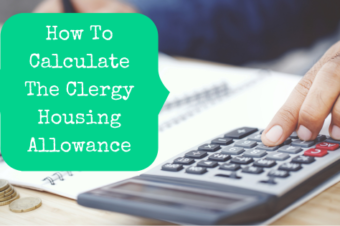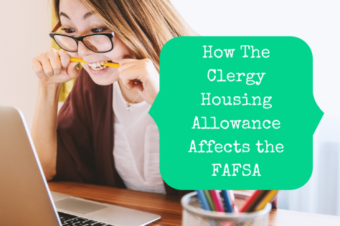
By law, a minister’s housing allowance must be designated by a church or church denomination. But what does that mean? Surely a mosque or synagogue would count since the government isn’t allowed to discriminate between religions.
The IRS uses a different meaning for church than most of us do in our everyday language. Church for them has more to do with an organization’s religious purpose than their actual religion or common vocabulary. The truth is, Section 107 of the Internal Revenue Code that lays out the clergy housing allowance does not actually define the term church.
How The IRS Identifies A Church
Since the law doesn’t spell things out, there have been disagreements that have led to court cases throughout the years. The decisions in those court cases are what the IRS has used to develop a list of characteristics that they attribute to churches. This is what the IRS looks for to be able to call something a church:
- Distinct legal existence
- Recognized creed (set of fundamental beliefs) and form of worship
- Definite and distinct ecclesiastical government
- Formal code of doctrine and discipline
- Distinct religious history
- Membership not associated with any other church or denomination
- Organization of ordained ministers
- Ordained ministers selected after completing prescribed courses of study
- Literature of its own
- Established places of worship
- Regular congregations
- Regular religious services
- Sunday schools for the religious instruction of the young
- Schools for the preparation of its members
When determining whether an organization is classified as a church for federal tax purposes, the IRS looks at these characteristics along with other facts and circumstances. They look at the organization’s religious purposes and how it accomplishes those religious purposes. A church does not have to have all of the above attributes to qualify. At a bare minimum, a church must have two things:
- A body of believers or communicants
- The body of believers assembles regularly in order to worship
Examples Of Court Tax Rulings
If you don’t have a group of people that gets together regularly to worship, you are not a church. And if that’s not your primary purpose, then you’re not a church either. The court has stated that if bringing people together for worship is only an incidental part of an organization’s activities, that’s not enough to call the organization a church. Many schools have regular chapel services and teach religious coursework, but they are still considered schools, not churches.
In one court case, De La Salle Institute v. US, a religious group’s non-profit ran a winery and distillery. On the premises was a chapel where they could worship. They claimed that the non-profit was a church and an integral part of a church and so should be exempt from paying certain taxes. Neither the IRS nor the tax court judge bought it. They determined that it was not a church, it was a winery.
While having prayer meetings at your tech company won’t make it a church, the IRS still goes beyond the usual connotations for their definition of a church. If you’re an ordained minister who preaches, performs weddings, and officiates funerals, you still may be able to take a housing allowance even if you don’t work for a “traditional” church.
This is exemplified in the Whittington v. Commissioner tax court case. There was a ministry that presented the gospel through crusades, services, and publications that had a loyal, regular following. Their leaders conducted daily services and married, performed funerals for, and counseled their followers, many of whom were not associated with other religious organizations. The IRS denied the leaders a housing allowance because they did not work for a church. The leaders challenged it and the tax court judge sided with them, declaring that their ministry counts as a church because they have a body of believers.
They aren’t just flexible about the structure of your “church.” If you act like a church, even if you don’t have traditional beliefs, you can still qualify as a church. That’s what happened in the Foundation of Human Understanding v. Commissioner tax court case. A foundation based on Judeo-Christian principles and the doctrine and teachings of its founder claimed to be a church. They owned buildings in two different locations where they conducted regular services for a congregation of over 50 people. They also had a school where their beliefs were taught to children and owned a retreat center for seminars and meetings. The IRS said that it didn’t qualify as a church but the tax court judge struck that down and ruled that they are a church.
How To Get A Final Determination
While I really hope you don’t start a cult, I highlight these examples to show you that you don’t necessarily have to work for a traditional church for it to qualify to designate you a housing allowance. The IRS is fairly flexible in its definition.
I wish I could spell it out to you more clearly, but this is all that we have because of the way our legal and tax system works. If you have any doubts as to the validity of your organization as a church, you can request a private letter ruling from the IRS. Or, you can get audited and take the IRS to tax court for a final decision. Have fun with that.





2 Responses
Don Reed
April 8, 2020But a question remains – If you are not working for a traditional church group, but just some people meeting, even for worship, then who has the authority to ‘approve’ an excludable housing allowance. Or must they be organized legally as a group? That is not in your ‘two things’ re: recognition as qualified.
Amy
April 9, 2020Don, I think in that case you would need to seek guidance from the IRS. If it’s just a group of people meeting for worship without any organizational structure I would be surprised if the IRS would consider it a church for purposes of the housing allowance. If it were approved, it would be the leadership that would designate the housing allowance for the pastor.